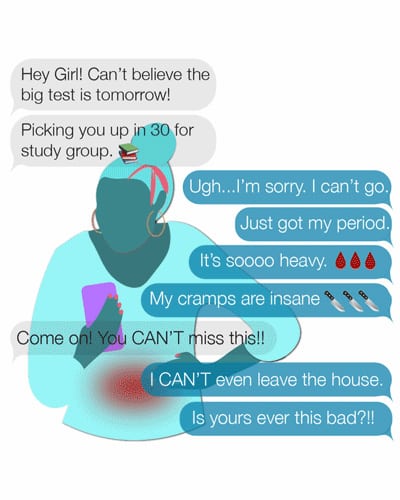Endometriosis in Adolescents

Approximately two-thirds of women diagnosed with endometriosis in adulthood had symptoms of the disease before age 20.
The delay in diagnosis may result in long-term problems. These could include pelvic adhesions, chronic pain, pain during sex, infertility, psychological issues, and the development of endometrial and ovarian cancer.
Research has shown that most adolescents do not know about endometriosis. There is, therefore, a need to provide menstrual health education in secondary schools to improve girls’ knowledge about the disease. This could help them identify any gynecological problems in time and get the necessary treatment.
Who is at risk?
Although researchers don’t know the exact cause of endometriosis, they think there may be genetic factors contributing to its development. Adolescents who have close relatives (mothers, sisters, and aunts) with endometriosis have about a seven to 10 times higher chance of developing the condition themselves.
Studies show that adolescents who start having periods earlier, have long menstrual cycles, and have a lower body mass index (BMI) also appear to have a higher risk of having endometriosis.
The prevalence of endometriosis is also higher in women with uterine malformations (bicornuate uterus, for example). This is particularly the case for those where the normal menstrual outflow is blocked.
Symptoms of endometriosis in adolescents
Mild pain or discomfort, especially on the first few days of a period, is very common amongst adolescents. However, in the case of endometriosis, there is severe pelvic pain that occurs even outside the period. This pain also may not respond to pain medications. It may, therefore, cause distress or inability to attend school or perform daily activities.
Other symptoms may include gastrointestinal symptoms (abdominal pain, bloating, irritable bowel, nausea, diarrhea, and constipation) and urinary symptoms (painful overactive bladder and abnormal uterine bleeding). Psychiatric symptoms like anxiety, depression, and panic attacks may also be present.
How do doctors diagnose endometriosis in adolescents?
Due to the lack of awareness about endometriosis and the fact that most adolescents are in the early stages of the disease, diagnosis is difficult and often delayed. In fact, young girls generally have to see four or more physicians before receiving a diagnosis of endometriosis.
Subtle lesions also mean that methods such as ultrasound or MRI are unable to diagnose endometriosis in adolescents.
Like in adults, the best way to diagnose endometriosis in adolescents is still laparoscopic surgery that an experienced surgeon conducts. He or she will decide on a case-by-case basis whether to perform surgical diagnosis and treatment.
How can adolescents identify symptoms of endometriosis?
Fertility awareness-based methods (FABMs) encourage women to familiarize themselves with their menstrual cycle by keeping track of their period dates or observing cervical secretions and basal body temperature. FABMs encourage adolescents to become more aware of how their bodies react and change throughout their cycle. Analyzing cervical mucus and remembering to take basal body temperature may be challenging, however, especially for an adolescent. Thus, starting with a simple method of period tracking and keeping a diary of pain and symptoms may be a helpful first step.
One or more of the FABMs methods, especially keeping a symptom diary, could be usefull to identify endometriosis symptoms in adolescents. This could allow speedier diagnosis and early intervention, and improve outcomes.
Treatment options available
There is no definite cure for endometriosis. Pain medications such as Ibuprofen can sometimes reduce the pain. Birth control pills or intrauterine devices may also help reduce the pain in some cases. They will likely be the next line of treatment if over-the-counter pain medications do not provide relief. Excision surgery remains the gold standard treatment. However, it may not be the right answer in every case and patients should thoroughly discuss with an expert before deciding to have surgery. In all cases of treatment in adolescents when endometriosis is suspected warrants consultation with a physician that has experience in the field.
Get a Second Opinion
Our endometriosis specialists are dedicated to providing patients with expert care. Whether you have been diagnosed or are looking to find a doctor, they are ready to help.Our office is located on 872 Fifth Avenue New York, NY 10065.
You may call us at (646) 960-3080 or have your case reviewed by clicking here.